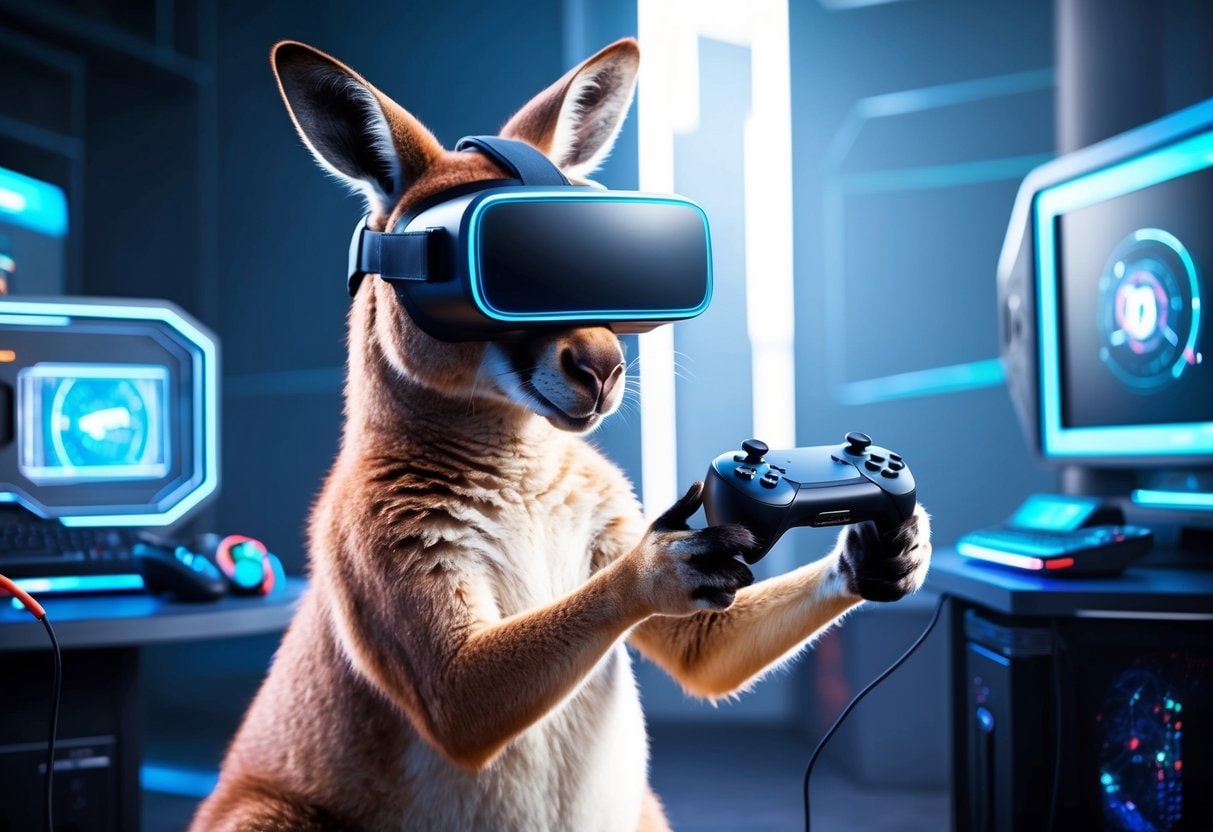Australia's gaming industry has emerged as a powerhouse on the global stage. From pioneering platforms to the launch of a new online casino Australia, Aussie tech companies are crafting innovative games and technologies that captivate players worldwide. The Australian gaming market is projected to grow at an annual rate of 9.81% from 2024 to 2027, solidifying its position as a major player in the global gaming landscape.

You might be surprised to learn that many popular games and gaming technologies have their roots Down Under. From mobile hits to cutting-edge virtual reality experiences, Australian developers are pushing boundaries and setting new standards. This surge in creativity and innovation has not gone unnoticed, with major international publishers and investors taking keen interest in the Aussie gaming scene.
The success of Australia's gaming industry isn't just about creating fun experiences. It's driving economic growth, creating jobs, and fostering a thriving tech ecosystem. As you explore the world of Aussie gaming, you'll discover a vibrant community of developers, artists, and entrepreneurs who are shaping the future of interactive entertainment on a global scale.
Advancements in Game Development
Australian game developers are pushing the boundaries of what's possible in gaming. Cutting-edge technologies are transforming how games are created, played, and experienced globally.
Innovative Tech in AAA Games
AAA games from Aussie studios are showcasing groundbreaking tech. You'll find photorealistic graphics powered by real-time ray tracing and advanced physics simulations creating more immersive worlds. Motion capture and facial animation technologies are bringing characters to life with unprecedented realism.
Virtual and augmented reality integrations are expanding gameplay possibilities. You can now step into fully realised 3D environments, interacting with game worlds in ways previously unimaginable.
Procedural generation techniques are enabling vast, diverse game worlds that feel organic and alive. This tech allows for near-infinite replayability as environments and quests can be uniquely generated for each playthrough.
AI and Automation in Game Creation
AI is revolutionising game development workflows. You'll see machine learning algorithms assisting with tasks like:
- Generating art assets and textures • Creating realistic NPC behaviours • Balancing game mechanics • Optimising performance
These tools are speeding up development cycles and allowing smaller teams to create more ambitious projects. AI-driven testing can identify bugs and gameplay issues faster than ever before.
Natural language processing is enabling more dynamic and responsive dialogue systems. Characters in games can now engage in more lifelike conversations, adapting to player choices and actions.
Facilitating Access with Cloud Gaming
Cloud gaming is removing hardware barriers, making high-end gaming experiences more accessible. You can now stream graphically intensive games to nearly any device with a solid internet connection.
Australian developers are embracing this tech, optimising their games for cloud platforms. This opens up new markets and allows for seamless cross-platform play.
The cloud also enables more robust multiplayer experiences. Massive persistent worlds can be hosted and updated in real-time, supporting thousands of concurrent players.
Game saves and progress can be synced across devices, letting you pick up where you left off on any screen. This flexibility is changing how and where people play games.
The Impact of Australian Game Developers
Australian game developers are making their mark on the global stage. Their innovative creations and growing industry presence are shaping the future of gaming worldwide.
Government Support and Funding
The Australian government recognises the potential of the gaming industry. You'll find a range of initiatives aimed at boosting local game development. The Digital Games Tax Offset (DGTO) offers a 30% refundable tax offset for eligible spending on games development. This incentive encourages both local and international studios to invest in Australian projects.
The Australian Interactive Games Fund, though short-lived, provided crucial support to developers from 2013 to 2014. Its impact is still felt today, having kick-started several successful studios.
State governments also chip in. Victoria and Queensland offer additional tax incentives and grants for game developers. These programs help create jobs and foster innovation in the sector.
Screen Australia's Role
Screen Australia plays a vital part in nurturing Aussie game development talent. You can access funding through their Games: Expansion Pack program. This initiative supports small to medium-sized studios in creating original IP.
The agency also offers:
- Marketing support for completed games
- Mentorship programs for emerging developers
- Networking opportunities at industry events
Screen Australia's backing has led to the creation of critically acclaimed titles like 'Untitled Goose Game' and 'Hollow Knight'. These games have put Australian developers on the map and inspired a new generation of creators.
Prominent Aussie Studios
You'll find a diverse range of game developers making waves from Down Under. Here are some standout studios:
- Team Cherry (Adelaide): Creators of the hit indie game 'Hollow Knight'
- House House (Melbourne): The minds behind 'Untitled Goose Game'
- Halfbrick Studios (Brisbane): Known for mobile sensations like 'Fruit Ninja' and 'Jetpack Joyride'
- Mighty Kingdom (Adelaide): Specialists in licensed and original IP mobile games
These studios showcase the creativity and technical prowess of Australian developers. Their success has attracted global attention and investment, further strengthening the local industry.
Monetisation Strategies and Market Growth
Australian tech companies are leveraging innovative approaches to boost revenue and expand their reach in the global gaming industry. These strategies are driving significant market growth and opening up new opportunities.
Subscription Models and Recurring Revenue
Many Aussie gaming firms have embraced subscription-based models to create steady income streams. You'll find that popular titles now offer monthly or annual plans, giving you access to exclusive content and features. This shift has proven lucrative, with some companies reporting up to 30% increases in average revenue per user.
Subscription tiers often include:
- Basic: Core game access
- Premium: Additional characters and levels
- VIP: Early access to new releases and special events
By focusing on customer retention, these models have helped stabilise cash flow and improve financial forecasting for game developers.
Exploring New Monetisation Avenues
Aussie tech firms are tapping into fresh revenue sources beyond traditional game sales. In-app purchases have become a major profit driver, with cosmetic items and power-ups being particularly popular. Some companies have seen in-app revenue grow by 40% year-on-year.
Other innovative approaches include:
- Branded collaborations with films and music artists
- Limited-time events with exclusive purchasable content
- Cross-platform synergies between mobile and console games
These strategies have allowed Australian developers to diversify their income and reduce reliance on initial game sales alone.
Assessment of Industry Growth
The Australian gaming sector has shown remarkable expansion, outpacing global averages. Recent figures indicate an annual growth rate of 8-10% for the industry. This surge is partly attributed to the increasing smartphone penetration and improved mobile internet speeds across the country.
Key growth indicators:
- Market value expected to reach AUD 5 billion by 2025
- Employment in the sector up 25% since 2020
- Export revenue from Australian-made games growing at 15% annually
Untapped markets in Southeast Asia and India present significant opportunities for further expansion, with Australian firms well-positioned to capitalise on cultural similarities and geographic proximity.
Trends Shaping the Gaming Ecosystem
Australia's gaming industry is evolving rapidly, driven by technological advancements and changing player preferences. Key trends are reshaping how games are developed, played and monetised across the country.
Mobile and Social Gaming Influence
Mobile gaming continues to dominate the Australian market. Smartphones and tablets have become the primary gaming devices for many Aussies, offering convenience and accessibility. Social features are increasingly integrated into mobile games, allowing players to connect, compete and share experiences.
Popular genres include casual puzzle games, battle royales and augmented reality titles that blend the virtual and physical worlds. Local developers are creating mobile games tailored to Australian tastes and humour.
Revenue models are shifting towards free-to-play with in-app purchases. This approach has proven highly successful, generating steady income streams for game publishers.
Virtual and Augmented Reality
VR and AR technologies are gaining traction in Australia's gaming scene. While still niche, they're poised for growth as hardware becomes more affordable and content offerings expand.
VR headsets provide immersive experiences for gaming and beyond. They're being used for everything from first-person shooters to virtual tourism applications. AR games overlay digital elements onto the real world, with Pokémon GO's success paving the way for more ambitious projects.
Australian developers are exploring innovative uses of XR tech:
- Educational games that bring history to life
- Training simulations for various industries
- Interactive storytelling experiences
Esports and Competitive Gaming
The esports industry is booming in Australia. Professional gaming tournaments attract large audiences both online and in-person. Major cities are building dedicated esports arenas to host events.
Popular esports titles include:
- League of Legends
- Counter-Strike: Global Offensive
- Dota 2
- Fortnite
Universities now offer esports scholarships and degree programs. This reflects the growing legitimacy of competitive gaming as a career path.
Streaming platforms like Twitch have created new opportunities for Australian gamers to build audiences and monetise their skills. Local content creators are finding success by catering to Aussie gaming communities.
